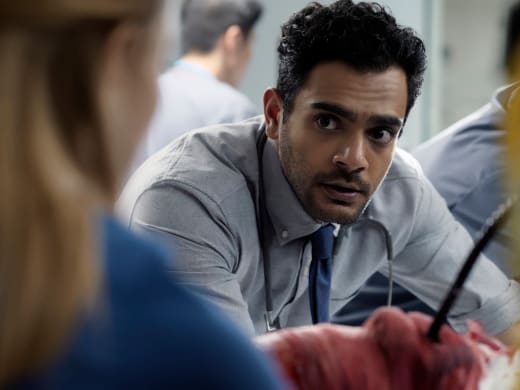After all the bells and whistles of exposition, we’re now at the stage during Transplant Season 1 Episode 2, where Dr. Hamed being at the hospital is an unremarkable occurrence.
Dr. Hamed has officially been hired but not before being faced with casual Islamophobia as he arrives on his first day from an ER attendant. As he walks into his first surgery and his colleagues don’t know he’s been hired, we can tell that it’s going to be a challenging adjustment.
At least, that’s the goal of this hour. Transplant Season 1 Episode 1 was exciting because it was a major fish-out-of-water situation, so the burden is on the second episode to keep that momentum up as the show pivots to a standard procedural.
Things start normalizing when Dr. Bishop comes in and lets everyone know that Dr. Hamed is not just a good samaritan interloper, but, in fact, a real doctor.
Talk about throwing the guy to the wolves? You didn’t bother to have your HR department brief them?
Hamed: You can’t be here
Leblanc: If the rebar punctuates the major artery, it could potentially be lethal.
Hamed: Yeah, I know that, you can’t just show up and volunteer as a doctor
Leblanc: I’m not
….
Malone: What the hell do you think you’re doing
Bishop: His job
Dr. Bishop’s British accent is not much of a coincidence: He fits the archetype of the stoic and rigid British administrator. It’s almost as if the audition call sheet said “a doctor like House but more British.” Pretty disappointing stereotype.
Bishop orders Hamed to make the rounds with Dr. Leblanc, which gives the opportunity to develop another character. As the pair do their rounds, Leblanc is cordial and even openly curious about her new colleague but sets firm boundaries and makes sure he knows who’s boss.
On top of her assertiveness, she’s good-looking, single, intelligent, and does the medical procedural walk-and-talk as well as can be done.
It’s not that much of stress that if Dr. Hamed isn’t completely asexual, he’s impressed. It’s probable these two will collide romantically at some distant point. Not too soon, I hope.
In the interim, Hamed meets Theo Hunter (Jim Watson), who must be a breath of fresh air to Bashir because he’s actually nice to the new guy.
There’s also a notable banter Hunter and Leblanc that shows Leblanc at her looser side. This is the kind of banter you can eventually expect with the pretty lady, Bashir, if you hang around.
The main hospital story of the week is the father of a patient who is afraid that his daughter will be taken away from him because he had a brush-up with social services two years ago.
Social Worker: Can you talk to me about the bruising of Irene, I need to know what we’re dealing with here
Bashir Hamed: You thought that the bruising was caused by her husband?
Social Worker: You don’t?
Bashir Hamed: Well, she’s suffering from kidney failure or liver failure. Either could cause bruising
Social Worker: This family is a flag. They had a history with children’s aid society. There was an incident two years ago. Leila fell down the stairs and CAS intervened for her protection.
Bashir Hamed: I meant medically undetermined, not intentional…
Social Worker: You wrote suspicious, so I have to investigate as protocol
What the show does well here is how quickly it established the dad in the story as a marginalized character. His tattoos, wardrobe, and demeanor posit him as a lower-class white individual.
Classist discrimination is overtly suggested by Hunter, who observes, “It doesn’t seem fair, but he’ll always be seen with suspicion first.” Is he referring to the incident of suspected assault two years ago or a previous history?
In the wake of the Black Lives Matter and many young activists positing that the world is best divided between privileged white people and people of color, this episode might be someone jarring, but it is true that there are also marginalized white communities.
It’s also not too much of a stress to imagine that his income level, neighborhood, or history of prior incidents might have led to the Canadian version of social services putting him in an undesirable box when they responded to the incident.
Aside from the main storyline, there were three other medical patients that some screen time, but they really don’t register because they weren’t really developed human characters on their own. Unless you’re really, really into medical jargon.
Instead, these cases involving patients that we don’t care about serve to highlight happenings between the characters we do care about. Shows need B-stories to break up the action, and this is a bit of a different approach. Does it work? Hard to say.
The opening patient (who has rebar in him) highlights how out of place Dr. Hamed is as the new guy.
The second case (a man with jaundice) shows off Hamed’s mad skills and introduces conflict between LeBlanc and Hamed. It also sets up the closing speech where Bishop can growl disapprovingly at Hamid. That’s pretty much the sum of Bishop’s contributions so far.
The last case involves a pregnant woman who has some swelling issues down under. Or something like that, I couldn’t keep track. It’s a snippet of social commentary on how the system is harsh on pregnant women.
It also parallels how Dr. Curtis (Ayisha Issa) sees herself as undervalued as a woman or a newer member of the staff.
If the social commentary in ”Tell Me Who You Are” aims to teach us one thing, it’s the dangers of an inhumane bureaucracy. In addition, to the patient of the week’s negative experiences with social service, Bashir has problems with his transcript.
LaVondra Kelly: Welcome to the team, I’m still waiting for your transcripts.
Bashir Hamed: Excuse me?
LaVondra Kelly: Your medical transcripts from (looking down on her chart) the University of Aleppo
Bashir Hamed: I sent the pdf
LaVondra Kelly: Did someone follow up with you on that? Legal still needs certified original copies of those transcripts. Without them we won’t be able to verify your credentials
Bashir Hamed: If I needed some time to coordinate that….?
LaVondra Kelly: Last year the infectious disease unit bought in a Somali candidate. A doctor who pioneered a leading approach to malaria in this country. He couldn’t get his documents in order either and now he does data entry at a university lab.

As for the main patient, LeBlanc and Hamed work to deduce that it was food poisoning and not something malicious that put the girl in the hospital, exonerating the father. Problem solved!
Except Dr. Bishop doesn’t like the way that Hamed handled one of the other cases of the nameless patient we never cared about.
Does anyone want to guess where audience sympathy will go on that one?
At the end of a long day, Bashir and Amira sit down on the fire escape and talk with an assurance that the future will be brighter for them.
Random Observations:
- Why didn’t they just make Bashir and Amira a dad and daughter instead of siblings? It just makes me more curious about the wide age range of births.
- It took over 18 minutes of screentime before we even met the patient of the week not counting commercials. That was my number one reason for knocking the rating down.
- I think Dr. Bishop is Scottish. Maybe the stiff boss is a Scottish stereotype?
- I can see a fun drinking game over how much of this medical termniology you have to google?
What do you think of the insignificant cases of the week as b-stories instead of one story?
Is the show settling into a groove?
Take the time to watch Transplant online!
Orrin Konheim is a staff writer for TV Fanatic. Follow him on Twitter and his personal blog at Sophomore Critic.






